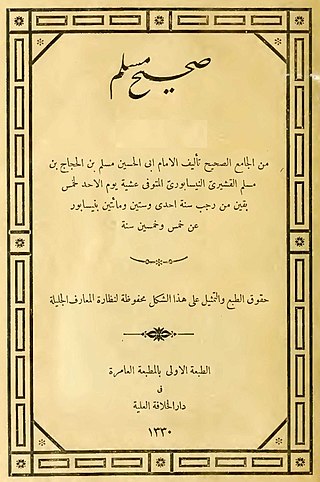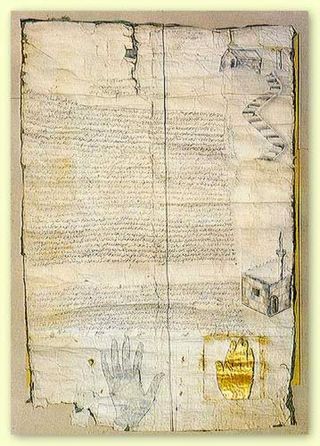This article needs to be updated.(March 2024) |
Selma A. Cook is managing editor of the Youth Section and Volunteer Youth Resource Network at IslamOnline. [1]
This article needs to be updated.(March 2024) |
Selma A. Cook is managing editor of the Youth Section and Volunteer Youth Resource Network at IslamOnline. [1]
Selma A. Cook became a Muslim in 1988 in her native country of Australia. [2] She migrated to Egypt in 1993. [3]
She has written a book about her journey to Islam called The Miracles of My Life, an Islamic poetry book called The Light of Submission, as well as the Miss Moppy [4] series (Islamic stories for children).
She wrote her first Islamic novel for teenagers called Buried Treasure, which is the first in the ‘Amirah Stevenson series'. [5] She writes articles and poetry on her Website The Islamic Garden. [6]
She works[ when? ] for Hoda, a Cairo-based satellite channel. [2]
{{cite book}}: CS1 maint: multiple names: authors list (link)
Ḥadīth or Athar refers to what most Muslims and the mainstream schools of Islamic thought believe to be a record of the words, actions, and the silent approval of the Islamic prophet Muhammad as transmitted through chains of narrators. In other words, the ḥadīth are attributed reports about what Muhammad said and did.

Abū Zakariyyā Yaḥyā ibn Sharaf al-Nawawī (Arabic: أبو زكريا يحيى بن شرف النووي;, popularly known as al-Nawawī or Imam Nawawī, was a Sunni Shafi'ite jurist and hadith scholar. Al-Nawawi died at the relatively early age of 45. Despite this, he authored numerous and lengthy works ranging from hadith, to theology, biography, and jurisprudence that are still read to this day.

Yusuf al-Qaradawi was an Egyptian Islamic scholar based in Doha, Qatar, and chairman of the International Union of Muslim Scholars. His influences included Ibn Taymiyya, Ibn Qayyim, Sayyid Rashid Rida, Hassan al-Banna, Abul Hasan Ali Hasani Nadwi, Abul A'la Maududi and Naeem Siddiqui. He was best known for his programme الشريعة والحياة, al-Sharīʿa wa al-Ḥayāh, broadcast on Al Jazeera, which had an estimated audience of 40–60 million worldwide. He was also known for IslamOnline, a website he helped to found in 1997 and for which he served as chief religious scholar.

The Night of Power, is, in Islamic belief, the night when Muslims believe the Quran was first sent down from heaven to the world and also the night when the first verses of the Quran were revealed to the Islamic prophet Muhammad; it is described as better than a thousand months of worshipping. According to various hadiths, its exact date is uncertain but it was one of the odd-numbered nights of the last ten days of Ramadan, the ninth month of the Islamic calendar. Since that time, Muslims have regarded the last ten nights of Ramadan as being especially blessed. Muslims believe that the Night of Qadr comes again every year, with blessings and mercy of God in abundance.

Safa and Marwa are two small hills, connected to the larger Abu Qubais and Qaiqan mountains, respectively, in Mecca, Saudi Arabia, now made part of Al-Masjid al-Haram. Muslims travel back and forth between them seven times in what is known as saʿī ritual pilgrimages of Ḥajj and Umrah.

Sahih al-Bukhari is the first hadith collection of the Six Books of Sunni Islam. It was compiled by Persian scholar al-Bukhari around 846. The author was born in Bukhara in today's Uzbekistan.

Sahih Muslim is the second hadith collection of the Six Books of Sunni Islam. It was compiled by Persian scholar Muslim ibn al-Ḥajjāj.
Shams ad-Dīn adh-Dhahabī, also known as Shams ad-Dīn Abū ʿAbdillāh Muḥammad ibn Aḥmad ibn ʿUthmān ibn Qāymāẓ ibn ʿAbdillāh at-Turkumānī al-Fāriqī ad-Dimashqī was an Athari theologian, Islamic historian and Hadith scholar.

The Ashtiname of Muhammad, also known as the Covenant or Testament (Testamentum) of Muhammad, is a charter or writ granting protection and other privileges to the followers of Jesus, given to the Christian monks of Saint Catherine's Monastery in the Sinai Peninsula. It is sealed with an imprint representing Muhammad's hand.
Enjoining good and forbidding wrong are two important duties imposed by Allah, as revealed in the Quran and Hadith.
Tawassul is an Arabic word originated from 'wasilat'. The wasilah is a means by which a person, goal or objective is approached, attained or achieved. In another version of the meaning of tawassul in another text: Tawassul is an Arabic word that comes from a verbal noun, wasilah, which according to Ibn Manzur in Lisān al-'Arab means "a station of King, a rank, or act of devotion". In other words, it refers to a position of power due to one's proximity to the king or sovereign. While the tawassul or tawassulan is the use of wasilah for this purpose. In religious contexts, the tawassul is the use of a wasilah to arrive at or obtain favour of Allah.

Hadith studies consists of several religious scholarly disciplines used by Muslim scholars in the study and evaluation of the Islamic hadith—i.e. the record of the words, actions, and the silent approval of the Islamic prophet, Muhammad.
Muḥammad ibn Ali ibn Muḥammad ibn Abd Allah, better known as al-Shawkānī (1759–1834), was a prominent Yemeni Sunni Islamic scholar, jurist, theologian and reformer. Shawkani was one of the most influential proponents of Athari theology and is revered as one of their canonical scholars by Salafi Muslims. His teachings played a major role in the emergence of the Salafi movement. Influenced by the teachings of the medieval Hanbali scholar Ibn Taymiyya, Al-Shawkani became noteworthy for his staunch stances against the practice of Taqlid, calls for direct interpretation of Scriptures, opposition to Kalam as well as for his robust opposition to various folk practices which he condemned as shirk (idolatry).

Riyad as-Salihin, The Meadows of the Righteous, or The Gardens of the Righteous, is a compilation of verses from the Quran supplemented by hadith narratives written by Al-Nawawi from Damascus (1233–1277). The hadith by al-Nawawī belongs to the category of canonical Arabic collections of Islamic morals, acts of worship, and manners, which are from the Hadith.
Ibn Asakir was a Syrian Sunni Islamic scholar, who was one of the most prominent and renowned experts on Hadith and Islamic history in the medieval era. and a disciple of the Sufi mystic Abu al-Najib Suhrawardi. Ibn Asakir was an accomplished jurist, hadith specialist and a prolific writer. He was the pre-eminent figure of the Asakir dynasty, whose family members occupied the most prominent positions as judges and scholars of the Shafi'i school of the Sunni law in Damascus for almost two centuries.

Al-Waabil as-Sayyib min al-Kalim at-Tayyib is a book by Islamic scholar Ibn Qayyim Al-Jawziyya.
Ayman ibn ʿUbayd, was an early Muslim and companion of the Islamic prophet Muhammad.

Ahmad Zayni Dahlan (1816-1886) was the Grand Mufti of Mecca between 1871 and his death. He also held the position of Shaykh al-Islam in the Hejaz and Imam al-Haramayn. Theologically and juridically, he followed the Shafi'i school of thought.

Abū ‘Abd Allāh Muḥammad ibn Shihāb ad-Dīn Jalāl ad-Dīn al-Maḥallī ; aka Jalaluddin was an Egyptian renowned mufassir and a leading specialist in the principles of the law in Shafi'i jurisprudence. He authored numerous and lengthy works on various branches of Islamic Studies, among which the most important two are Tafsir al-Jalalayn and Kanz al-Raghibin, an explanation of Al-Nawawi's Minhaj al-Talibin, a classical manual on Islamic Law according to Shafi'i fiqh.
Canonized Islamic scripture are texts which Muslims believe were revealed by God through various prophets throughout humanity's history—specifically the Quran and Hadith. Muslims believe the Quran to be the final revelation of God to mankind, and a completion and confirmation of previous scriptures. It was believed to have been revealed to the Islamic prophet Muhammad from 620 CE to 632 CE, and canonized in an official, unified text during the caliphate of Rashidun Uthman, around 650 CE.
{{cite web}}: CS1 maint: archived copy as title (link){{cite web}}: CS1 maint: archived copy as title (link)